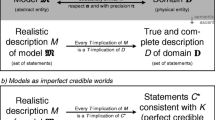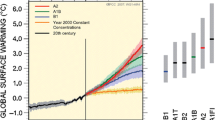Abstract
A number of authors, including me, have argued that the output of our most complex climate models, that is, of global climate models and Earth system models, should be assessed possibilistically. Worries about the viability of doing so have also been expressed. I examine the assessment of the output of relatively simple climate models in the context of discovery and point out that this assessment is of epistemic possibilities. At the same time, I show that the concept of epistemic possibility used in the relevant studies does not fit available analyses of this concept. Moreover, I provide an alternative analysis that does fit the studies and broad climate modelling practices as well as meshes with my existing view that climate model assessment should typically be of real possibilities. On my analysis, to assert that a proposition is epistemically possible is to assert that it is not known to be false and is consistent with at least approximate knowledge of the basic way things are. I, finally, consider some of the implications of my discussion for available possibilistic views of climate model assessment and for worries about such views. I conclude that my view helps to address worries about such assessment and permits using the full range of climate models in it.
Similar content being viewed by others
Notes
I have for the most part bracketed nuances of analyses, such as relativisation to speaker, that are irrelevant to my concerns in this paper.
See, e.g., Hawthorn (2012, p. 493).
See, e.g., Moore (1962, p. 184).
See, e.g., Stanley (2005, pp. 127–128).
See, e.g., Hacking (1967, p. 149).
See, e.g., DeRose (1991, pp. 593–594).
See, e.g., Przyjemski (2017, p. 190).
The sense of ‘uncertainty’ used here is epistemic.
It is contentious whether probabilities should be interpreted in objective terms in the context of climate predictions, but the concern here is how to justify the reliance on probabilities rather than how to interpret them. Justification seems to be required if we are to answer the question why we ought to rely on probabilistic climate predictions.
The characterisation of real possibility I use here permits real possibilities to be in the past, present or future. I thus recognise that we are interested in past, present and future real possibilities. In an earlier discussion (Katzav et al. 2012, p. 270) my focus was solely on future real possibilities. Further, note that I am not here offering a necessary condition for being a real possibility but only a sufficient one.
Buckwalter et al. (2020) review and support the case for the view that knowledge can be approximate.
Perhaps DeConto and Pollard are, like me, concerned with epistemic possibilities that appropriately map onto real possibilities. I think this is correct and is supported by some of the language in their paper, such as the use of ‘potentiality’ in the already provided quote about the upper bound of Antarctica’s contribution to sea-levels. But this is tangential to my discussion here. For present purposes, what matters is that DeConto and Pollard are concerned with epistemic possibilities.
Proponents of the ignorance view can distinguish between ‘plausible’ and ‘epistemically possible’ because they think epistemic possibilities require no supporting arguments. In Sect. 4, I will be pointing out that ‘plausible’ in the sense just specified is in practice distinguished from ‘epistemically possible’ because establishing that something is epistemically possible is supposed to require more than just having some supporting argument for it.
Here, and in what follows, I follow climate science research in treating knowledge as evidence. More in particular, knowledge of ice, ocean and atmosphere coupling that climate models cannot currently take into account is recognised to be evidence here. Although we cannot calculate what this impact might be and thus do not have quantitative knowledge of it, we do have qualitative knowledge of it. In other terms, we do recognise in an imprecise way how it can enhance/mitigate effects.
A forcing is a net change in the radiative flux into the atmosphere, one that is due to some factor which, like anthropogenic CO2, is external to the climate system.
I here limit my discussion to full, as opposed to hemispheric, EMICS.
References
Archer, D., & Ganopolski, A. (2005). A movable trigger: Fossil fuel CO2 and the onset of the next glaciation. Geochemistry Geophysics Geosystems, 6, Q05003. https://doi.org/10.1029/2004GC000891.
Berger, A., & Loutre, M. F. (2002). An exceptionally long interglacial ahead? Science, 297(5585), 1287–1288.
Betz, G. (2010). What’s the worst case? The methodology of possibilistic prediction. Analyse & Kritik, 87–106.
Betz, G. (2015). Are climate models credible worlds? Prospects and limitations of possibilistic climate prediction. European Journal of Philosophy of Science, 5, 191–215.
Buckwalter, W., & Turri, J. (2020). Knowledge, adequacy, and approximate truth. Consciousness and Cognition, 83, 102950.
Claussen, M., Mysak, L., Weaver, A., et al. (2002). Earth system models of intermediate complexity: Closing the gap in the spectrum of climate system models. Climate Dynamics, 18, 579–586.
Clerc, F., Minchew, B. M., & Behn, M. D. (2019). Marine Ice Cliff instability mitigated by slow removal of ice shelves. Geophysical Research Letters. https://doi.org/10.1029/2019GL084183.
Colledge, N. R. (2020). Long-term projections of sea-level rise from ice sheets. WIREs Climate Change, 11, 1–21.
DeConto, R. M., & Pollard, D. (2016). Contribution of Antarctica to past and future sea-level rise. Nature, 531, 591–597.
DeRose, K. (1991). Epistemic possibilities. The Philosophical Review, 100(4), 581–605.
Dougherty, T., & Rysiew, P. (2009). Fallibilism, Epistemic possibility, and Concessive Knowledge attributions. Philosophy and Phenomenological Research, 78(1), 123–132.
Dougherty, T., & Rysiew, P. (2011). Clarity about concessive knowledge attributions: Reply to Dodd. Synthese, 181(3), 395–403.
Edwards, T. L., Brandon, M. A., Durand, G., Edwards, N. R., Golledge, N. R., Holden, P., Payne, A. J., Ritz, C., & Wernecke, A. (2019). Revisiting Antarctic ice loss due to marine ice cliff instability. Nature” Nature, 566, 58–64.
Ganopolski, A., Winkelmann, R., & Schellnhuber, H. (2016). Critical insolation–CO2 relation for diagnosing past and future glacial inception. Nature, 529, 200–203.
Gilford, D. M., Ashe, E. L., DeConto, R. M., Kopp, R. E., Pollard, D., & Rovere, A. (2020). Could the last interglacial constrain projections of future Antarctic ice mass loss and sea-level rise? Journal of Geophysical Research: Earth Surface, 125, e2019JF005418. https://doi.org/10.1029/2019JF005418.
Hacking, I. (1967). Possibility. The Philosophical Review, 76(2), 143–168.
Hawthorn, J. (2012). Knowledge and epistemic necessity. Philosophical Studies, 158, 493–501.
Imbrie, J., & Imbrie, J. Z. (1980). Modeling the climatic response to orbital variations. Science, 207(4434), 943–953.
Imbrie, J., et al. (1993). On the structure and origin of major glaciation cycles 2. The 100,000-year cycle. Paleoceanography, 8(6), 699–735.
Katzav, J. (2014). The epistemology of climate models and some of its implications for climate science and the philosophy of science. Studies in the History and Philosophy of Modern Physics, 46(B), 228–238.
Katzav, J., Dijkstra, H. A., & Jos de Laat, A. T. J. (2012). Assessing climate model projections: State of the art and philosophical reflections. Studies in History and Philosophy of Modern Physics, 43(4), 258–276.
Katzav, J., Thompson, E. L., Risbey, J., Stainforth, D. A., Bradley, S., & Frisch, M. (2021). On the appropriate and inappropriate uses of probability distributions in climate projections and some alternatives. Climatic Change, 169, 15.
Kopp, R. E., Gilmore, E. A., Little, C. M., Trueba, L., Ramenzoni, J., & Sweet, V. C., W. V (2019). Usable science for managing the risks of sea-level rise. Earth’s Future, 7, 1235–1269.
Kratzer, A. (1991). Modality. In von A. Stechow, & D. Wunderlich (Eds.), Semantics: An International Handbook of Contemporary Research. de Gruyter.
Le Cozannet, G., Manceau, J. C., & Rohmer, J. (2017). Bounding probabilistic sea-level projections within the framework of the possibility theory. Environmental Research Letters, 12, 014012.
Maasch, K. A., Oglesby, R. J., & Fournier, A. (2005). Barry Saltzman and the theory of climate. Journal of Climate, 18(13), 2141–2150.
Moore, G. E. (1962). Commonplace book: 1913–1953. Routledge.
Nicholls, R. J., Hanson, S. E., Lowe, J. A., Slangen, A. B. A., Wahl, T., Hinkel, J., & Long, A. J. (2021). Integrating new sea-level scenarios into coastal risk and adaptation assessments: An ongoing process. WIREs Climate Change, 12, e706.
Pattyn, F., & Morlighem, M. (2020). The uncertain future of the Antarctic ice sheet. Science, 367, 1331–1335.
Pettigrew, R. (2021). What is justified credence? Episteme, 18(1), 16–30.
Pollard, D., DeConto, R. M., & Alley, R. B. (2015). Potential Antarctic ice sheet retreat driven by hydrofracturing and ice cliff failure. Earth and Planetary Science Letters, 412, 112–121.
Przyjemski, K. (2017). Strong epistemic possibility and evidentiality. Topoi, 36, 183–195.
Rudin, D. (2016). “Deriving a Variable-Strength Might,” In Proceedings of Sinn und Bedeutung, 20: 587–603.
Saltzman, B. (1985). Paleoclimatic modelling. In A. D. Hecht (Ed.), Paleoclimate Analysis and Modelling (pp. 341–396). Wiley.
Saltzman, B. (1988). Modelling the slow climate attractor. In M. E. Schlesinger (Ed.), Physically-based Modelling and Simulation of Climate and Climatic Change (Vol. 243, pp. 737–754). Springer. NATO ASI Series.
Saltzman, B., Maasch, K. A., Verbitsky, M., & Ya (1993). Possible effects of anthropologically-increased CO2 on dynamics of climate: Implications for ice age cycles. Geophysics Research Letters, 20(11), 1051–1054.
Sjölin Wirling, Y., & Grüne-Yanoff, T. (2021). Epistemic possibility and objective possibility in Science. British Journal for the Philosophy of Science. https://doi.org/10.1086/716925.
Stainforth, D. A., Downing, T. E., Washington, R., Lopez, A., & New, M. (2007). Issues in the interpretation of climate model ensembles to inform decisions. Philosophical Transactions of the Royal Society A: Mathemtatics and Physics, 365, 2163–2177.
Stanley, J. (2005). Fallibilism and concessive knowledge attributions. Analysis, 65(2), 126–131.
von Fintel, K., & Gillies, S. (2008). CIA leaks. The Philosophical Review, 117(1), 77–98.
Author information
Authors and Affiliations
Corresponding author
Additional information
Publisher’s Note
Springer Nature remains neutral with regard to jurisdictional claims in published maps and institutional affiliations.
Rights and permissions
Springer Nature or its licensor (e.g. a society or other partner) holds exclusive rights to this article under a publishing agreement with the author(s) or other rightsholder(s); author self-archiving of the accepted manuscript version of this article is solely governed by the terms of such publishing agreement and applicable law.
About this article
Cite this article
Katzav, J. Epistemic possibilities in climate science: lessons from some recent research in the context of discovery. Euro Jnl Phil Sci 13, 57 (2023). https://doi.org/10.1007/s13194-023-00560-7
Received:
Accepted:
Published:
DOI: https://doi.org/10.1007/s13194-023-00560-7




